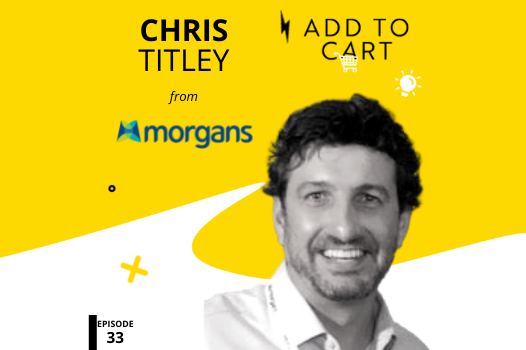In this episode of Add To Cart, we are joined by Chris Titley, a stockbroker at Morgans. Chris has a special interest in fin-techs, digital banks and payment methods. He even hosts his own podcast on the matter, Bank to the Future, where he interviews founders and leaders from fin tech businesses who are doing things a little differently.
In the chat, Chris covers everything from the buy now pay later emergence, how open banking has opened up disruption opportunities and which metrics investors look for in emerging businesses.
“There’s going to be a wave of fin-techs coming through, devising different ways of doing things, and the winner may not already be in front of us“
Chris Titley
Questions answered in this episode include…
- What significant changes have we seen in fin-tech in 2020?
- What is open banking?
- What are the key metrics in business performance that tell you whether a company is worth investing in?
Chris shares what the future may hold in the payments space
“A few years ago you had the push from a number of people to accept Cryptocurrency and Bitcoin. I think that was a trend that came and potentially could come in the future as well. I think a lot of retailers were thinking, Oh, should we accept this payment method? How do we accept this payment? And there was a lot of talk at the time about that, particularly with the euphoric rise of the Bitcoin price. so the verification of Bitcoin as an accepted payment method is probably a trend, which I think may continue over time. Now, whether it’s Bitcoin or Ripple or whichever digital currency, the mere concept of a digital currency run on the Blockchain, I think has probably got legs over the next decade or so. I don’t know when or how, but I think it will become an easier payment method. So that was one, one sort of thing that, that sort of popped up a year or so ago or two years ago.
We’ve had the adoption, and Australia has probably been a first mover, in the reverse lay-by, which is buy now pay later. Some call it alternative to credit, some call it a lender, some are actually using credit cards, like Split It for instance, so the credit cards are not going to die. And they’re going to leverage the outstanding balance, for instance. So, if you look at a car, for instance, when Uber first came out, it had the big Uber sticker and then some people tell me in San Francisco and even here in Brisbane, they ended up having an Uber sticker and an Ola sticker, a Lyft sticker on the front. Then you’ve got restaurants and they’ve got Uber Eats, they’ve got Deliveroo and Menu Log. They’ve got three laptops and three point of sales and you’ve got three different combinations.
It’s very clunky, but that’s the way the market’s evolved because of distribution and the ability for another channel to assist you with your order. Then you’ve got a kogan.com and you go to the checkout now and you’ve got five or six different payment methods. So I think it’s normal. I think that competition comes inevitably. There’ll be one or two to two winners in particular payments I think. You’ve got the behemoth in Paypal, then even beyond that, you’ve got Visa, Mastercard. They’re looking to partner with various fin techs and other ways and methods of doing things. So there’s big players already in it. And then you’ve got the rise of the smaller players and I’m calling Afterpay small, it’s 25 billion market cap and small compared to PayPal and Visa and MasterCard. Then you’ve got on the SME side, you’ve got things like Xero, which are helping small businesses transact as well.
There are lots of good things that are happening from the payments point of view coming out of Australia. But I do think, inevitably the checkout size will probably shrink from six to three or four, but right now it’s six and probably people will determine which ones they want to pay for. And that’s the way the market will go. That’s where the retailers will go.”
Chris clears up the term ‘open banking’ and give us the low down on exactly what it is
If you’ve got some data, let’s call it a Commonwealth Bank account, you’ve banked with them all your life. You obviously spend a tap and go and you have direct debits, et cetera. So your file is your spending habits and your income coming in from your work. Now, if you were to go to get a loan, a car loan or a home loan, et cetera, then most people will ask for those bank statements to check on how you’re going and to verify your expenditure. There’s various algorithms you can run over the back of that, but really with open banking, it means that I can probably take my CBA file over to Westpac in a pretty quick instance and then analyze that as opposed to me giving Westpac my CBA login.
The applications that can happen on the back of that, for instance, could be that let’s say an insurance aggregator comes along and says, oh, well, you give us your file from Westpac and we’ll scrape your bank account and we’ll run analysis and we’ll say, look, you’re actually spending $264 a month on home and contents insurance. Got some daycare built into them, which means you probably have some kids. We also see where you’ve got a mortgage and we can see how much you’re paying on your mortgage. And therefore, did you realize that you’re playing, you know, 3.8-4% instead of 2.6%? So it’s about the analyzing of the transactional data and the whole appeal is to give consumers more choice and more awareness of exactly where they’re spending and attempting to give them a better deal.
If you think about My Health Record – if you go to a doctor and you’ve got a sore back and they said, have you had any back history, pains, then you say, oh, I had surgery seven years ago. Now that doctor doesn’t have that data, but some doctor will, and with something like My Health Record, that file gets sent to that doctor. And they go, I can see you had surgery seven years ago. So it’s very similar in my head, something like My Health Record, where you have the data and you can move it around”.
Chris believes that cash is king when it comes to assessing a business from an investment point of view
“Metrics have changed recently on some things, from net profit after tax, which is certainly not out the door, but people now use EBITDA a lot more than NPAT. People are now using all sorts of things on the tech front, like revenue multiples and revenue to EV. From a business point of view, cash is still very much important in the business and some would argue, the most important. That’s one thing which some businesses have done well over time, losing a lot of money, then making a lot of money. I think things like Uber have lost money for a long period of time, and still, people are a bit undecided, whether that’s going to be an ultra ultra successful business model or not. Netflix is one of those as well.
Looking locally, things like Xero lost a heap of money and were burning a lot of money through their growth period and have now turned the corner. So there are anomalies when it comes to spending money to grow. It’s probably a riskier strategy from the lifeline of a startup or an emerging tech, but, inevitably, you know, I would just say focus on the dollars, be focused on where the dollars go. I think when people will raise capital and they raised three million or five million, and I’ve seen it hundreds of hundreds of times, they need to have a really focused view on where that money is going to go”.
Links from the episode
- Morgans Financial
- Bank to the Future podcast
- ASX200
- Paypal
- Cryptocurrency
- Bitcoin
- Blockchain
- Ripple
- Afterpay
- Mastercard
- Visa
- Xero
- Humm
- Laybuy
- Split it
- Open Pay
- MoneyMe
- Fu
- Before Pay
- Amazon
- CSL
- Warren Buffett
- EBITDA (Earnings Before Interest, Taxes, Depreciation, and Amortization)
- NPAT (Net Profit After Tax)
- Signet and Little Wildling Co. (sponsored)
- Shopify Plus and Aje (sponsored)




